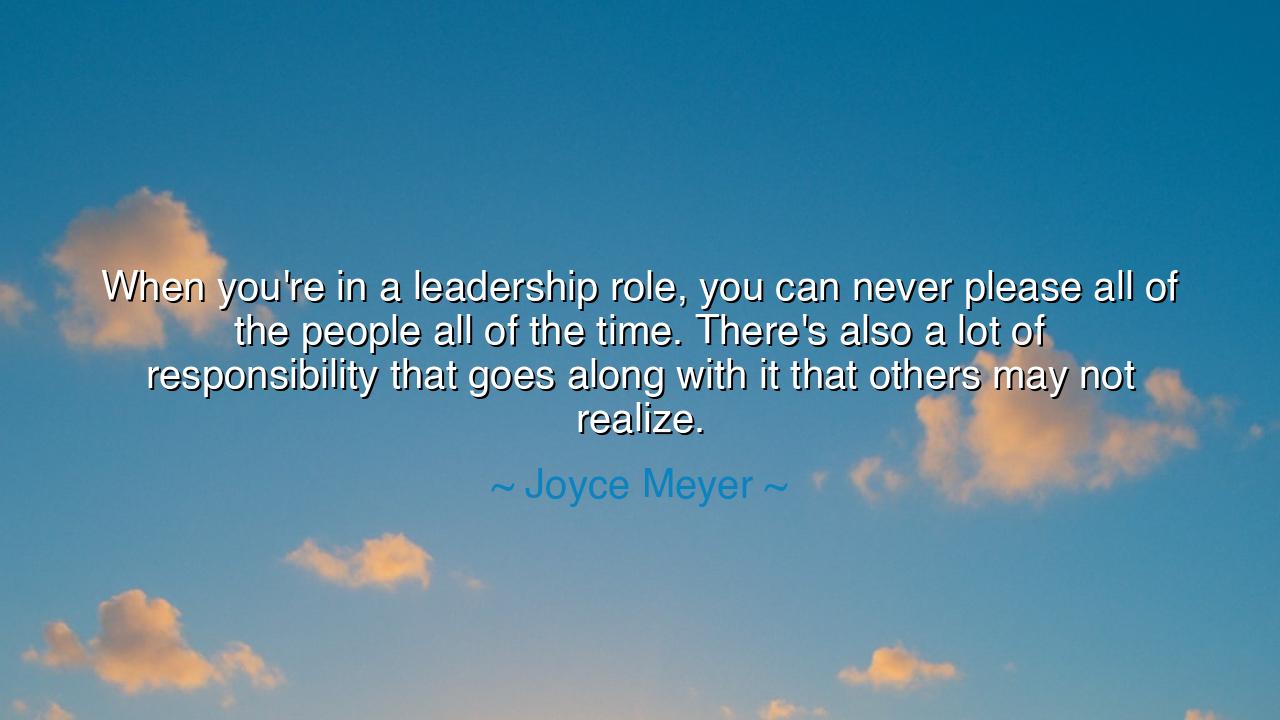
When you're in a leadership role, you can never please all of the
When you're in a leadership role, you can never please all of the people all of the time. There's also a lot of responsibility that goes along with it that others may not realize.






Hear, O seekers of wisdom and burden-bearers of destiny, the words of Joyce Meyer, a teacher of courage and faith: “When you’re in a leadership role, you can never please all of the people all of the time. There’s also a great responsibility that goes along with it that others may not realize.” These words ring with the weight of truth, for they speak to the loneliness, the trials, and the silent strength that dwell in the heart of every true leader. For leadership is not the pursuit of praise, but the endurance of purpose — a road where applause is fleeting, but responsibility eternal.
The ancient ones knew this truth well. The crown, they said, is a circle of thorns disguised in gold. To wear it is to bear the invisible pain of choice — to act not for one’s comfort, but for the good of all. The path of leadership demands that one must often stand between the people and their desires, between the possible and the right. And in that place, no decision pleases all. The weak crave to be liked; the wise strive to be just. For as Joyce Meyer teaches, pleasing everyone is not the work of a leader, but the temptation of a coward. The leader must instead please truth, conscience, and the divine law written within the heart.
Think, O listeners, upon the story of Moses, chosen to lead his people from the chains of Egypt. When he obeyed the call of God, the people rejoiced. But when hunger struck, they cursed him. When he gave them freedom, they demanded comfort. They murmured against him even as he prayed for their deliverance. Yet Moses did not bend his purpose to their whims. He carried the burden of their doubt as his own, for that is the responsibility of leadership — to stand firm even when misunderstood, to press forward even when alone. And in his steadfastness, he became more than a man — he became a vessel of divine will.
So too has every true leader walked this narrow way. Abraham Lincoln, the savior of a divided nation, was despised by many in his own time. His words were mocked, his motives doubted. Yet he bore the pain of a thousand criticisms in silence, knowing that responsibility outweighs reputation. In the darkness of war, he said, “I do the very best I know how — the very best I can; and I mean to keep on doing so until the end.” He pleased not all, but he pleased history, and the echo of his integrity endures beyond the grave.
This, then, is the heart of Meyer’s teaching: leadership is not a throne of comfort, but a furnace of refinement. It tests the soul with loneliness, sharpens the spirit through resistance, and reveals the measure of a person not by their followers’ cheers, but by their courage in the storm. The true leader must love the people enough to disappoint them when wisdom demands it, and love truth enough to suffer for it. To lead is to carry the invisible responsibility of the many — their hopes, their fears, their future — even when they cannot see it themselves.
O children of tomorrow, take this lesson to heart: seek not the role of leadership for the sake of power, for power without compassion corrupts. Seek it instead when the call of duty stirs within you, when you see what must be done though others hesitate. And when you lead, remember this: you will be blamed for storms you did not summon and hated for decisions you did not desire. But stand firm, for truth is a light that burns quietly, and in the end, it will vindicate you.
And when you find yourself weary beneath the weight of others’ expectations, recall these words — that no one can please all of the people all of the time. Be at peace with this truth. Listen with humility, decide with wisdom, and act with integrity. For responsibility is the true crown of the leader, and its glory is found not in comfort, but in the quiet knowing that one has done what is right. The applause of the world fades quickly, but the honor of a steadfast heart echoes across generations.
Therefore, lead not for favor, but for faith. Walk not to please, but to guide. And when doubt surrounds you like fog, lift your eyes to the light within. For that light — born of courage, duty, and love — is the mark of a true leader, the one who bears the people’s woe, yet carries their hope. Such a soul, though seldom understood, is the pillar on which the world itself endures.






AAdministratorAdministrator
Welcome, honored guests. Please leave a comment, we will respond soon